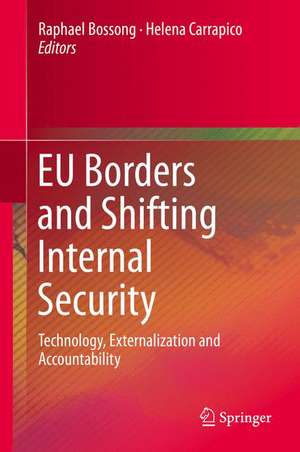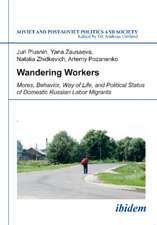EU Borders and Shifting Internal Security: Technology, Externalization and Accountability
Editat de Raphael Bossong, Helena Carrapicoen Limba Engleză Hardback – 29 feb 2016
| Toate formatele și edițiile | Preț | Express |
|---|---|---|
| Paperback (1) | 638.11 lei 6-8 săpt. | |
| Springer International Publishing – 16 mar 2019 | 638.11 lei 6-8 săpt. | |
| Hardback (1) | 644.30 lei 6-8 săpt. | |
| Springer International Publishing – 29 feb 2016 | 644.30 lei 6-8 săpt. |
Preț: 644.30 lei
Preț vechi: 758.01 lei
-15% Nou
Puncte Express: 966
Preț estimativ în valută:
123.29€ • 127.39$ • 102.56£
123.29€ • 127.39$ • 102.56£
Carte tipărită la comandă
Livrare economică 19 martie-02 aprilie
Preluare comenzi: 021 569.72.76
Specificații
ISBN-13: 9783319175591
ISBN-10: 3319175599
Pagini: 320
Ilustrații: X, 238 p. 3 illus.
Dimensiuni: 155 x 235 x 20 mm
Greutate: 0.53 kg
Ediția:1st ed. 2016
Editura: Springer International Publishing
Colecția Springer
Locul publicării:Cham, Switzerland
ISBN-10: 3319175599
Pagini: 320
Ilustrații: X, 238 p. 3 illus.
Dimensiuni: 155 x 235 x 20 mm
Greutate: 0.53 kg
Ediția:1st ed. 2016
Editura: Springer International Publishing
Colecția Springer
Locul publicării:Cham, Switzerland
Cuprins
Acknowledgements.- The Multimensional Nature and Dynamic Transformation of European Borders and Internal Security.- The Making (Sense) of EUROSUR: How to Control the Sea Borders?.- How to Liquefy a Body on the Move: Eurodac and the Making of the European Digital Border.- Patrolling Power Europe. The Role of Satellite Observation in EU Border Management.- Integrated Border Management and Irregular Migration at the South European-North African Border.- Protecting Citizens, Securitising Outsiders? Consular Affairs and the Externalisation of EU's Internal Security.- EU-Belarus Cooperation in Border Management: Mechanisms and Forms of Norm Transfer.- The Legal Reach of Police and Judicial Co-operation in Criminal Matters (PJCCM) Measures Across EU Borders.- Police and Customs Cooperation Centres and their Role in EU Internal Security Governance.- Towards More Security? The Involvement of the National Parliaments in the Reform of the Schengen Agreements.- Overcoming Liberal Constraints in the Field of Migrant Return: Re-establishing Political Control Over Borders at the Cost of Fundamental Rights?.- Justifying Control: EU Border Security and the Shifting Boundaries of Political Arrangement.
Notă biografică
Raphael Bossong is lecturer in European Studies at the European University Viadrina, Frankfurt/O. and researcher at the Institute for Peace Research and Security Policy, Hamburg. He holds a BA in Social and Political Sciences from the University of Cambridge, and a MA and PhD in International Relations from the London School of Economics and Political Sciences. His research, which contributed to several EU-funded research projects, focuses on the intersection between EU crisis management, internal and external security policy and public administration. He has published in leading international peer-reviewed journals, such as the Journal of Common Market Studies, Journal of European Public Policy, Journal of Intervention and Statebuilding and European Security, while he also authored a monographic study on the historical evolution of EU security policy since 9-11 (2012).
Helena Carrapico joined Aston University in September 2014 as a Lecturer in Politics and International Relations. Her research focuses on European Union Justice and Home Affairs, in particular organised crime policies. Prior to her current position, Helena Carrapico was a Newton International Fellow at the University of Dundee, where she worked on the Justice and home Affairs opt-in and opt-out strategies of the United Kingdom. Previous academic positions were also held at James Madison University (Lecturer), the University of Coimbra (Post- doctoral fellow) and the Austrian Academy of Sciences (Researcher). She holds a doctoral degree in Social and Political Sciences from the European University Institute (Florence). Helena Carrapico has published in the area of internal security in journals such as the European Foreign Affairs Review, European Security, the Journal of Information Technology and Politics and Global Crime. In addition, she has considerable experience editing journal special issues.
Helena Carrapico joined Aston University in September 2014 as a Lecturer in Politics and International Relations. Her research focuses on European Union Justice and Home Affairs, in particular organised crime policies. Prior to her current position, Helena Carrapico was a Newton International Fellow at the University of Dundee, where she worked on the Justice and home Affairs opt-in and opt-out strategies of the United Kingdom. Previous academic positions were also held at James Madison University (Lecturer), the University of Coimbra (Post- doctoral fellow) and the Austrian Academy of Sciences (Researcher). She holds a doctoral degree in Social and Political Sciences from the European University Institute (Florence). Helena Carrapico has published in the area of internal security in journals such as the European Foreign Affairs Review, European Security, the Journal of Information Technology and Politics and Global Crime. In addition, she has considerable experience editing journal special issues.
Textul de pe ultima copertă
This edited volume analyzes recent key developments in EU border management. In light of the refugee crises in the Mediterranean and the responses on the part of EU member states, this volume presents an in-depth reflection on European border practices and their political, social and economic consequences. Approaching borders as concepts in flux, the authors identify three main trends: the rise of security technologies such as the EUROSUR system, the continued externalization of EU security governance such as border mission training in third states, and the unfolding dynamics of accountability. The contributions show that internal security cooperation in Europe is far from consolidated, since both political oversight mechanisms and the definition of borders remain in flux. This edited volume makes a timely and interdisciplinary contribution to the ongoing academic and political debate on the future of open borders and legitimate security governance in Europe. It offers a valuable resource for scholars in the fields of international security and migration studies, as well as for practitioners dealing with border management mechanisms.
Caracteristici
Offers a multi-disciplinary perspective on the pressing and timely topic of European borders Presents an in-depth reflection on European border practices and their political, social and economic consequences Discusses the legitimacy and accountability of European border practices











